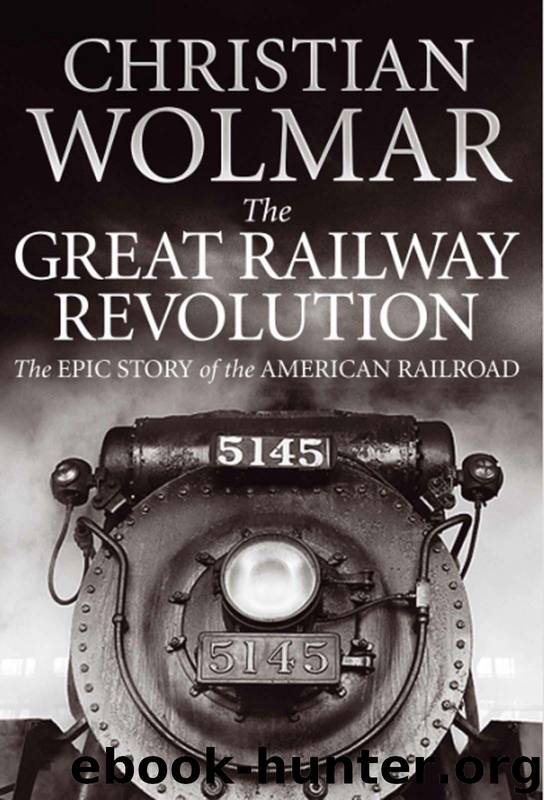The Great Railway Revolution: The Epic Story of the American Railroad by Christian Wolmar

Author:Christian Wolmar [Wolmar, Christian]
Language: eng
Format: mobi
Tags: United States, Non-Fiction, Engineering, World, History
ISBN: 9780857897794
Publisher: Atlantic Books
Published: 2012-05-09T16:00:00+00:00
EIGHT
THE END OF THE AFFAIR
By the end of the century the railways were by far the biggest business enterprise in the United States. Their mileage had increased to 200,000 as the tentacles of the ever-expanding iron road crept relentlessly across the country, connecting every sizeable community and many small ones. By then, almost every American lived within easy access of a railroad station and the railways carried everything from livestock to lobsters, ice to rice. The tracks went everywhere, to the mountain tops or down into the valleys, to the hotel door or the dock beside the ocean-going liner. They were quite simply ubiquitous, and their impact on both the development of the economy and the American way of life was universal. Given the sheer breadth and scale of their achievements, the railways should have enjoyed a golden age, feted by a grateful populace, rather like the car is loved by so many today. It should, indeed, have been the height of the love affair between the people and their railways. For a time, but only a very short one, it was. Richard White, the author of a book on the Transcontinentals, suggests rightly that Americans appreciated their railways despite their failings: ‘Nineteenth-century North Americans became quite aware of what transcontinental railroads failed to do, but initially they embraced them, as they embraced all railroads, as the epitome of modernity. They were in love with the railroads because railroads defined the age.’1 As White points out, the claims made for the railways were akin to those lavished on the internet before the collapse of the dotcom boom. This age of unbridled optimism could not last and it took barely a generation for the climate to change. During the final quarter of the nineteenth century the railways became, first, disliked, and then widely resented. It was partly a natural cycle. At first the railways had been the plucky innovator, the new kid on the block bringing prosperity and opening new horizons, then they became an established but respected business, and eventually they turned into the rapacious monopolist, reviled by almost everyone:
As the rail industry grew in size and became more distant from the public’s everyday concerns, it lost that sense of being the underdog that had long endeared it to the American public. Americans could readily identify with the idea of a courageous David fighting vast odds, and such an image enabled them to champion the tiny locomotives struggling against nature’s worst elements.2
As the railways became bigger, they lost the public support they had enjoyed in the early days. Sure, the man at the depot was still old Fred whose kids went to the local school but he now worked for an organization that was remote and disconnected from the local community. But it was not just the growth that changed people’s perceptions. The railways had indeed misbehaved and were guilty of all sorts of calumnies, but the level of antagonism they engendered was undoubtedly way beyond what they deserved given the positive changes they had inspired and the economic wealth they had created.
Download
This site does not store any files on its server. We only index and link to content provided by other sites. Please contact the content providers to delete copyright contents if any and email us, we'll remove relevant links or contents immediately.
Small Unmanned Fixed-wing Aircraft Design by Andrew J. Keane Andras Sobester James P. Scanlan & András Sóbester & James P. Scanlan(32136)
Navigation and Map Reading by K Andrew(4548)
Endurance: Shackleton's Incredible Voyage by Alfred Lansing(3834)
Wild Ride by Adam Lashinsky(1655)
And the Band Played On by Randy Shilts(1612)
The Box by Marc Levinson(1590)
Top 10 Prague (EYEWITNESS TOP 10 TRAVEL GUIDES) by DK(1562)
The Race for Hitler's X-Planes: Britain's 1945 Mission to Capture Secret Luftwaffe Technology by John Christopher(1523)
The One Percenter Encyclopedia by Bill Hayes(1460)
Girls Auto Clinic Glove Box Guide by Patrice Banks(1357)
Trans-Siberian Railway by Lonely Planet(1337)
Looking for a Ship by John McPhee(1316)
Fighting Hitler's Jets: The Extraordinary Story of the American Airmen Who Beat the Luftwaffe and Defeated Nazi Germany by Robert F. Dorr(1299)
Batavia's Graveyard by Mike Dash(1298)
Troubleshooting and Repair of Diesel Engines by Paul Dempsey(1279)
Bligh by Rob Mundle(1269)
TWA 800 by Jack Cashill(1249)
The Great Halifax Explosion by John U. Bacon(1227)
Ticket to Ride by Tom Chesshyre(1224)
